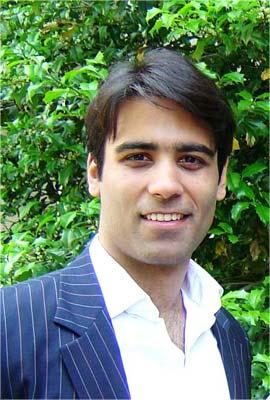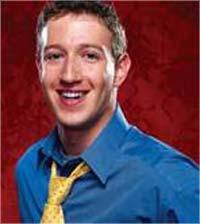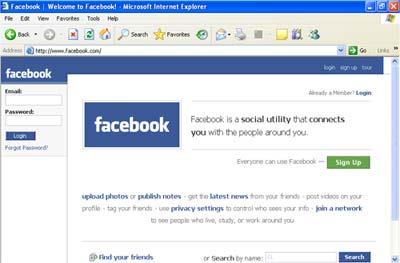Meet Divya Narendra, who has taken on Facebook

Divya Narendra, left, along with two other former Harvard students, has sued Facebook, the fast-growing social networking site.
The three men allege Facebook founder Mark Zuckerberg took the software code and a business plan from them.
Narendra, a 25-year-old Boston-based hedge fund analyst, will let his lawyer argue the case in the courtroom, but wants to speak about how he and his friends, the identical twins Cameron and Tyler Winklevoss thought up a social site for students called ConnectU four years ago and how they sought to protect members from those pretending to be students.
If the trio has its way they would like to shut down Facebook or at least get hefty compensation.
Last year, Facebook turned down a $1 billion offer from Yahoo Inc. Some Internet experts believe the network is worth much more than $1 billion.
In court filings, Facebook's attorneys say ConnectU has no evidence for 'broad-brush allegations' against Mark Zuckerberg, the founder of the site, and deny he stole the idea for Facebook from his fellow Harvard students.
'We knew it had to be a global connecting social network'

Each of them had different interests and activities,' Facebook's lawyers wrote. 'Only one of them had an idea significant enough to build a great company. That one person was Mark Zuckerberg,' left.
ConnectU's suit against Facebook has much more to do with seeking unspecified damages from Facebook, the three friends believe.
"I was raised on certain values," Narendra, the son of a New York physician couple who graduated with a degree in mathematics from Harvard, says. "And for me those values of integrity and honesty are crucial whether one is an hedge fund analyst or a entrepreneur."
A court in Boston will decide soon if the three friends indeed have a case against Facebook and its founder. The site reportedly has 34 million active members in more than 60 countries ranging from India to Iceland to Canada.
The founders of ConnectU, which has fewer than 100,000 members, claim Zuckerberg, who dropped out of Harvard, was involved in November 2003 in developing what became ConnectU, used code originally intended for it in the development of Facebook.
Facebook kicked off in February 24, 2004. ConnectU was launched the same year in May. In previous interviews, the Winklevoss brothers have said that some people think they sued Facebook only after it became hugely successful. They sued in 2004, the same year Facebook was launched and was struggling; the lawsuit came after the Winklevoss twins and Narendra failed to get Harvard University to stop Facebook.
Narendra has said along with his co-founders he appealed to Harvard's disciplinary board and directly to then president Lawrence H Summers, saying Zuckerberg had violated the school's honour code.
'At first we were devastated and climbed into a bottle of Jack Daniels for a bit,' the three said in a message posted on their site, 'but eventually emerged with a bad headache and renewed optimism. We weren't going to lie down and get walked over like this.'
Whatever the fate of Facebook or ContactU, Internet experts say the idea to start a site that allowed users to post profiles with pictures, biographies and other personal information and created networks of people at their schools or jobs or with similar interests, was fascinating and timely.
"I don't really remember how the idea of a social network for students came up," Narendra said recently. "But I -- and my friends, who were in the same dorm I was in -- had the feeling that there were too many barriers and lack of time for students at Harvard to do social networking based on common interests. We wanted to offer something that had immediate utility for the students."
"The twins, like me, understood the social dynamics of college communities," he says. And that was what got us to start Connect U."
It did not take him and his friends much time to think of a site serving students not just Harvard students but other American campuses too. "For that matter, we knew it had to be a global connecting social network," he says.
He admits that their idea may not have sounded original because there were others trying to bring students together for a wide variety of purposes ranging from romance to poltiics to religion. But they lacked quality control. "They were niche operations but they were not for everyone," he continues. "We thought of a critical piece of gate-keeping that would not only give our site credibility but also get the right kind of people in. We did not want people to join us pretending to be students, worse pretending to be a student of a particular university."
So the three insisted the members had a college e-mail address.
Narendra, who says his parents -- unlike many other immigrant parents -- never insisted he became a lawyer or a doctor or an engineer, had been convinced from his early days at Harvard that any idea that excited a handful of astute people could fly.
'It was like how real people meet in real life'

One of the key purposes of ConnectU was also to bring together the children of immigrants and get them discuss the social and professional pressure they faced at home.
"In any campus we find a very interactive environment," Narendra said, "but because of their work and studies schedule, not all students can become part of this wonderful environment."
ConnectU was meant to address that problem. "We wanted to mimic the reality," he says. "We wanted to simulate the situation that was available across the campus only for some students. It was like how real people meet in real life and discuss anything from student activism to academic progress to cultural issues."
The site the Winklevoss brothers and Narendra created was initially called HarvardConnection.com
They had asked Zuckerberg to write the code for the site, their suit maintains. The men began working on the site in 2002 and completed it a few months before Zuckerberg started Facebook.com
Zuckerberg was a sophomore at Harvard; the others were seniors and graduated in the spring of 2004.
'Basically, the idea behind the Web site, the original aspect, bringing social networking to the college level at various (campuses) -- that's what he took while claiming to work for us,' Narendra alleged in a previous interview.
The brothers have said since they and Narendra were not 'serious programmers,' they sought the unpaid help of many students. One of them was Zuckerberg.
The ConnectU creators said they had an 'oral contract' with Zuckerberg to finish building their site. He was not paid, they said, but he was a full member of their team and would have reaped any future rewards, according to the interviews the three men gave a few months ago.
Zuckerberg said in a recent interview that he had no business relationship with ConnectU. He said his lawyers plan to file a countersuit for defamation. 'I was a student who agreed to help a fellow student,' he said. 'I did not agree to complete their project.'
Facebook.com took off almost immediately, attracting thousands of users at Harvard and elsewhere, earning Zuckerberg a profile in the campus newspaper.
Narendra says the case has taken quite a bit of energy off him and his friends. Since its original filing in Massachusetts the lawsuit was dismissed without prejudice due to a technicality early this year. It was refiled in the US District Court in Boston.
As Narendra awaits the verdict, he is also weighing his academic and business options.
"One of them is go back to Harvard," says Narendra, who is not married. "Maybe I will study government or go into legal studies."
"One of the areas that interest me enormously," he says with a chuckle, "is the protection of intellectual property."
Source: http://specials.rediff.com/money/2007/sep/19rsld03.htm

Divya Narendra, left, along with two other former Harvard students, has sued Facebook, the fast-growing social networking site.
The three men allege Facebook founder Mark Zuckerberg took the software code and a business plan from them.
Narendra, a 25-year-old Boston-based hedge fund analyst, will let his lawyer argue the case in the courtroom, but wants to speak about how he and his friends, the identical twins Cameron and Tyler Winklevoss thought up a social site for students called ConnectU four years ago and how they sought to protect members from those pretending to be students.
If the trio has its way they would like to shut down Facebook or at least get hefty compensation.
Last year, Facebook turned down a $1 billion offer from Yahoo Inc. Some Internet experts believe the network is worth much more than $1 billion.
In court filings, Facebook's attorneys say ConnectU has no evidence for 'broad-brush allegations' against Mark Zuckerberg, the founder of the site, and deny he stole the idea for Facebook from his fellow Harvard students.
'We knew it had to be a global connecting social network'

Each of them had different interests and activities,' Facebook's lawyers wrote. 'Only one of them had an idea significant enough to build a great company. That one person was Mark Zuckerberg,' left.
ConnectU's suit against Facebook has much more to do with seeking unspecified damages from Facebook, the three friends believe.
"I was raised on certain values," Narendra, the son of a New York physician couple who graduated with a degree in mathematics from Harvard, says. "And for me those values of integrity and honesty are crucial whether one is an hedge fund analyst or a entrepreneur."
A court in Boston will decide soon if the three friends indeed have a case against Facebook and its founder. The site reportedly has 34 million active members in more than 60 countries ranging from India to Iceland to Canada.
The founders of ConnectU, which has fewer than 100,000 members, claim Zuckerberg, who dropped out of Harvard, was involved in November 2003 in developing what became ConnectU, used code originally intended for it in the development of Facebook.
Facebook kicked off in February 24, 2004. ConnectU was launched the same year in May. In previous interviews, the Winklevoss brothers have said that some people think they sued Facebook only after it became hugely successful. They sued in 2004, the same year Facebook was launched and was struggling; the lawsuit came after the Winklevoss twins and Narendra failed to get Harvard University to stop Facebook.
Narendra has said along with his co-founders he appealed to Harvard's disciplinary board and directly to then president Lawrence H Summers, saying Zuckerberg had violated the school's honour code.
'At first we were devastated and climbed into a bottle of Jack Daniels for a bit,' the three said in a message posted on their site, 'but eventually emerged with a bad headache and renewed optimism. We weren't going to lie down and get walked over like this.'
Whatever the fate of Facebook or ContactU, Internet experts say the idea to start a site that allowed users to post profiles with pictures, biographies and other personal information and created networks of people at their schools or jobs or with similar interests, was fascinating and timely.
"I don't really remember how the idea of a social network for students came up," Narendra said recently. "But I -- and my friends, who were in the same dorm I was in -- had the feeling that there were too many barriers and lack of time for students at Harvard to do social networking based on common interests. We wanted to offer something that had immediate utility for the students."
"The twins, like me, understood the social dynamics of college communities," he says. And that was what got us to start Connect U."
It did not take him and his friends much time to think of a site serving students not just Harvard students but other American campuses too. "For that matter, we knew it had to be a global connecting social network," he says.
He admits that their idea may not have sounded original because there were others trying to bring students together for a wide variety of purposes ranging from romance to poltiics to religion. But they lacked quality control. "They were niche operations but they were not for everyone," he continues. "We thought of a critical piece of gate-keeping that would not only give our site credibility but also get the right kind of people in. We did not want people to join us pretending to be students, worse pretending to be a student of a particular university."
So the three insisted the members had a college e-mail address.
Narendra, who says his parents -- unlike many other immigrant parents -- never insisted he became a lawyer or a doctor or an engineer, had been convinced from his early days at Harvard that any idea that excited a handful of astute people could fly.
'It was like how real people meet in real life'

One of the key purposes of ConnectU was also to bring together the children of immigrants and get them discuss the social and professional pressure they faced at home.
"In any campus we find a very interactive environment," Narendra said, "but because of their work and studies schedule, not all students can become part of this wonderful environment."
ConnectU was meant to address that problem. "We wanted to mimic the reality," he says. "We wanted to simulate the situation that was available across the campus only for some students. It was like how real people meet in real life and discuss anything from student activism to academic progress to cultural issues."
The site the Winklevoss brothers and Narendra created was initially called HarvardConnection.com
They had asked Zuckerberg to write the code for the site, their suit maintains. The men began working on the site in 2002 and completed it a few months before Zuckerberg started Facebook.com
Zuckerberg was a sophomore at Harvard; the others were seniors and graduated in the spring of 2004.
'Basically, the idea behind the Web site, the original aspect, bringing social networking to the college level at various (campuses) -- that's what he took while claiming to work for us,' Narendra alleged in a previous interview.
The brothers have said since they and Narendra were not 'serious programmers,' they sought the unpaid help of many students. One of them was Zuckerberg.
The ConnectU creators said they had an 'oral contract' with Zuckerberg to finish building their site. He was not paid, they said, but he was a full member of their team and would have reaped any future rewards, according to the interviews the three men gave a few months ago.
Zuckerberg said in a recent interview that he had no business relationship with ConnectU. He said his lawyers plan to file a countersuit for defamation. 'I was a student who agreed to help a fellow student,' he said. 'I did not agree to complete their project.'
Facebook.com took off almost immediately, attracting thousands of users at Harvard and elsewhere, earning Zuckerberg a profile in the campus newspaper.
Narendra says the case has taken quite a bit of energy off him and his friends. Since its original filing in Massachusetts the lawsuit was dismissed without prejudice due to a technicality early this year. It was refiled in the US District Court in Boston.
As Narendra awaits the verdict, he is also weighing his academic and business options.
"One of them is go back to Harvard," says Narendra, who is not married. "Maybe I will study government or go into legal studies."
"One of the areas that interest me enormously," he says with a chuckle, "is the protection of intellectual property."
Source: http://specials.rediff.com/money/2007/sep/19rsld03.htm
